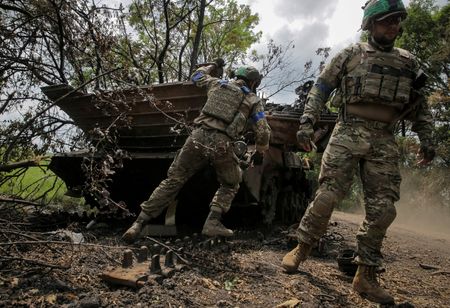 1
1 1
1
By Max Hunder and Vitalii Hnidyi
DONETSK REGION, Ukraine (Reuters) – On the eve of a key NATO summit in Vilnius, Ukrainian soldiers fighting fierce and costly battles called on the alliance to consider Kyiv’s demands for eventual accession, saying it may be the only way to end the war with Russia once and for all.
Ukraine’s forces have made some headway in their summer counteroffensive, but the gains have been slow and smaller than many had hoped in a sobering reminder of how the conflict in the south and east could drag on.
Povar, a 32-year-old marine infantryman who gave only his callsign and covered most of his face with a camouflaged scarf, said the Russians were well dug in, with complex trench networks and landmines.
He said his unit, part of the 35th marine brigade, had recently captured the village of Makarivka on the southeastern part of Ukraine’s 1,200 km (750 miles) frontline, although Povar was recovering from wounds at the time.
“I hope this will be the last war in Ukraine … that we finally put a full stop to this 300-year-long war,” Povar said, referring to Ukraine’s long and bloody struggle for independence from Moscow.
“When we have such a miserable neighbour, then we need to join some kind of alliance – join the civilised world – to have serious support and serious partners.”
President Volodymyr Zelenskiy concedes that Ukraine will probably not be allowed into NATO while the war with Russia is raging, but he is pushing for accession one day.
Kyiv sees membership as the ultimate deterrent against Russia attacking Ukraine again, after it illegally annexed Crimea in 2014 and launched a full-scale invasion in February last year.
ATTACK HARDER THAN DEFENCE
Soldiers in another brigade that liberated the nearby village of Neskuchne several weeks ago painted a bleak picture of the battlefield, despite gains they had achieved.
Andriy, a 35-year-old serviceman, said he and the rest of his team of some 70 troops had faced well-hidden Russian defensive lines and fields densely mined against both tanks and infantry. He said his unit had suffered unspecified casualties from the mines.
“This is just the way it is. You won’t see that on television,” he said at a practice shooting range in eastern Ukraine in late June.
Neskuchne was one of several settlements captured by Ukraine in a southward thrust along the Mokri Yaly river starting in June. Another key prong of the counteroffensive is to the northeast around the city of Bakhmut.
“Attack is not defence. It’s an entirely different war,” said Andriy, who volunteered for the army shortly after Russia’s main invasion began in February last year.
Ukraine has launched numerous attacks on Russian positions defending a salient of land north of the Sea of Azov that connects the Russian mainland to the occupied Crimean peninsula – a key strategic target for Ukraine.
Both Andriy and a younger member of the same team with the same first name, described heavy barrages of shelling, rocket artillery and cluster munitions, as well as Russian helicopters used to hit advancing Ukrainian forces.
Andriy said Russia appeared to be adapting its battlefield tactics, after previous, rapid counteroffensives last year in Kharkiv and Kherson regions exposed weakness in Russian defences.
“They learn just like we do,” he said.
MORE BULLET WOUNDS
On a recent visit by Reuters reporters to his position near Bakhmut, an exhausted field medic bandaged a gaping crimson hole in the hand of a Ukrainian soldier wounded in fighting less than an hour earlier.
He noted the rising proportion of small arms wounds – accounting for two of three soldiers brought to him from the battlefield that day.
The medic, who introduced himself by his callsign Yoda, said this was because the unit was on the offensive, which also yielded a higher number of casualties overall.
“In general, a week on the offensive would be the same as a month in defence,” he said. “In that short time, (the unit) will take as many dead and wounded as one which has been used in defence for that whole month.”
The 38-year-old is a field medic for Ukraine’s 57th motorised infantry brigade fighting near Bakhmut, the city captured by Russia from Ukraine after a 10-month struggle in which thousands of troops on both sides were killed.
Ukraine has claimed small advances around the city in recent weeks.
Yoda said he had been wounded four times over the course of the war, and that many soldiers were carrying injuries.
He said the unit faced a critical shortage of field medics due to the high casualty rate, as they sometimes had to make five journeys a day to the frontlines and back under shelling and enemy drone fire.
“Yesterday they went to a place where there were enemies. We laid out routes, but the route … turned out to be dangerous. We took losses there,” he recalled.
(Reporting by Max Hunder; Editing by MIke Collett-White and Alex Richardson)